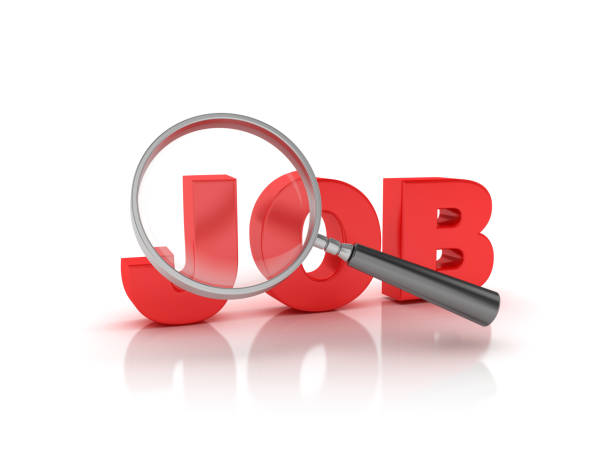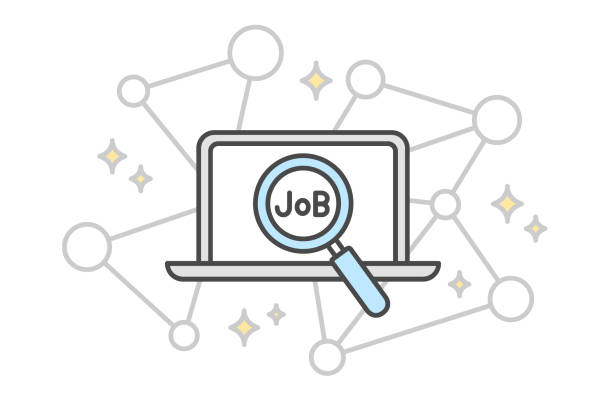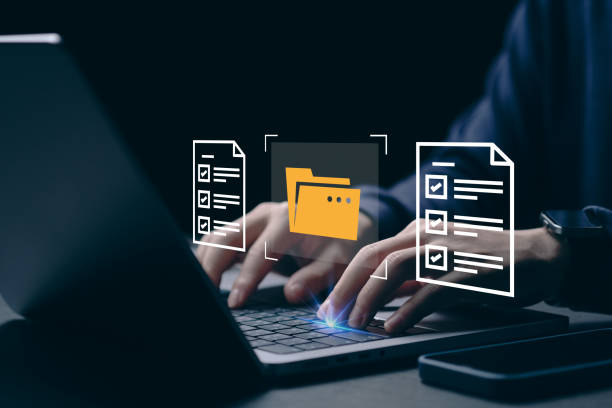### What is Off-Page SEO and Why is it Important?
Off-Page SEO refers to a collection of techniques and actions performed outside of your website to improve your site’s ranking in Google search results and other search engines.
In fact, Off-Page SEO shows search engines that your website is credible, popular, and trustworthy.
Search engines assess the quality and value of your website by examining external signals such as backlinks, brand name, and social media activity, and determine your site’s ranking in search results accordingly.
The importance of Off-Page SEO lies in the fact that many key ranking factors are not in your control, and you must strive to increase the credibility and value of your site through interactions with other websites and users.
Without a strong Off-Page SEO strategy, even with the best content and website design, you may fall behind in competition with other websites in search results. Off-Page SEO is not limited to backlinks; it includes extensive activities that help improve your brand’s credibility and recognition in the online space.
In other words, Off-Page SEO helps you become recognized as a credible and valuable resource in the minds of your audience and search engines.
Are you worried about your online store’s low conversion rates and lack of desired sales?
Rasaweb is your specialized solution for having a successful online store.
✅ Significant increase in conversion rates and sales
✅ Professional and user-friendly design to satisfy customers
⚡ Ready to transform your online sales? Get a free consultation!
Backlinks: The Foundation of Off-Page SEO
Backlinks are one of the most important factors in Off-Page SEO.
A backlink is essentially a link from another website to your website.
Search engines consider backlinks as a vote of confidence from other websites.
The more high-quality and relevant backlinks your website has, the higher your site’s credibility and ranking in search results will be.
Click here to preview your posts with PRO themes ››
Types of Backlinks
Backlinks come in various types, each having a different impact on your site’s SEO:
Follow Backlinks: These backlinks allow search engines to follow the link and pass authority to the destination website.
Nofollow Backlinks: These backlinks tell search engines not to follow the link and not to pass authority to the destination website.
Although nofollow backlinks do not directly affect site ranking, they can generate referral traffic and help increase brand visibility.
Sponsored and UGC Backlinks: These backlinks are used for advertising links and links generated by users, and they have less impact on site ranking.
Finding and Earning High-Quality Backlinks
Earning high-quality backlinks is one of the main challenges in Off-Page SEO.
To do this, you can use various methods: producing valuable and engaging content: High-quality and engaging content naturally encourages other websites to link to you.
Building relationships with websites related to your field: By building positive relationships and collaborating with other websites, you can have more opportunities to earn backlinks.
Participating in relevant events and conferences: By participating in events and conferences, you can meet people active in your field and create new opportunities for collaboration and earning backlinks.
Using social media: By being active on social media and sharing your content, you can attract more attention to your website and increase your chances of earning backlinks.
Specialized Strategies
In addition, there are more specialized strategies for earning backlinks:
Skyscraper Technique: Finding popular and trending content in your field, producing better and more comprehensive content, and then notifying websites that have linked to the original content.
Broken Link Building: Finding broken links on other websites and suggesting replacing them with a link to your own website.
Content Outreach: Identifying websites and blogs that are interested in topics related to your content and introducing your content to them.
| Backlink Acquisition Method | Description | Advantages | Disadvantages |
|---|---|---|---|
| Producing Valuable Content | Creating high-quality and engaging content that naturally attracts backlinks. | Sustainable, attracts audience, increases credibility | Time-consuming, requires expertise, high competition |
| Building Relationships | Establishing communication with other websites and influencers. | Collaboration opportunities, network expansion, increased brand awareness | Requires time and effort, potential for failure |
| Skyscraper Technique | Producing better content than existing content and informing linkers. | Targeted backlinks, increased traffic, improved ranking | Requires detailed research, time-consuming, potential for rejection |
The Importance of Domain and Page Authority in Off-Page SEO
Domain Authority (DA) and Page Authority (PA) are two important metrics provided by Moz and used to evaluate the power and authority of a website and its pages.
Domain Authority indicates how well a website is generally likely to rank in search results.
Page Authority indicates how well a specific page of a website is likely to rank in search results.
The higher the Domain Authority and Page Authority of a website, the more likely it is to rank higher in search results.
Domain Authority and Page Authority are calculated based on various factors such as the number and quality of backlinks, domain age, and website content.
To increase Domain Authority and Page Authority, you should try to earn high-quality backlinks, produce valuable content, and optimize your website structure.
Improving Off-Page SEO increases Domain and Page Authority.
Are you tired of losing business opportunities due to not having a professional corporate website?
Rasaweb helps you by designing a professional corporate website to:
✅ Build a powerful and reliable image of your brand
✅ Convert website visitors into loyal customers
⚡ Get a free consultation right now!
The Impact of Social Media on Off-Page SEO
Social media plays an important role in Off-Page SEO.
Although social media links do not directly affect site ranking (due to being nofollow), they can indirectly help improve Off-Page SEO.
Activity on social media increases brand awareness and drives more traffic to your website.
Sharing website content on social media makes your content more visible and increases the likelihood of earning backlinks.
Engaging with the audience on social media creates an active online community that can help increase your brand’s credibility and popularity.
To effectively use social media in Off-Page SEO, you must have a specific strategy and regularly share high-quality and engaging content on social media.
Also, you should engage with your audience and respond to their questions and comments.
Successful Off-Page SEO does not ignore an effective presence on social media.
The Role of Branding in Off-Page SEO
Branding plays a vital role in Off-Page SEO.
The more well-known and credible your brand is, the more likely people are to link to your website and talk about your brand.
Your brand name appears as a keyword in search results and increases brand traffic.
Creating a strong brand makes customers trust you and increases their likelihood of buying from you.
To create a strong brand, you must have a distinct visual identity, clearly express your values, and consistently produce high-quality and valuable content.
Also, you should be active on social media and engage with your audience.
Off-Page SEO is closely related to branding, and both help strengthen the credibility and popularity of your website.
Local SEO and Off-Page SEO
Local SEO and Off-Page SEO are related but different concepts.
Local SEO refers to optimizing your website and online presence to attract local customers.
Off-Page SEO refers to optimizing your website to improve its ranking in overall search results.
However, Local SEO and Off-Page SEO can strengthen each other.
For example, earning backlinks from credible local websites can help improve your local SEO.
Also, having a strong Google My Business profile can help increase your brand’s visibility in local search results.
To succeed in Local SEO and Off-Page SEO, you must have a comprehensive strategy and focus on both aspects simultaneously.
Good Off-Page SEO also strengthens local credibility.
| Feature | Local SEO | Off-Page SEO |
|---|---|---|
| Goal | Attract local customers | Improve ranking in overall search results |
| Key Factors | Google My Business profile, customer reviews, local citations | Backlinks, social media activity, branding |
| Impact | Increase local traffic, increase local sales | Increase overall traffic, improve domain authority |
Tools Needed for Off-Page SEO
To implement a successful Off-Page SEO strategy, you need various tools that help you monitor your website’s performance, check backlinks, and analyze competitors.
Some of the important Off-Page SEO tools include: Ahrefs: A comprehensive tool for checking backlinks, analyzing competitors, and discovering new backlink opportunities.
Moz: A popular tool for checking Domain Authority and Page Authority, tracking keyword rankings, and analyzing site SEO.
SEMrush: A powerful tool for keyword research, competitor analysis, and monitoring site SEO performance.
Google Search Console: A free tool from Google that helps you monitor your website’s performance in search results.
Google Analytics: A free tool from Google that helps you analyze your website’s traffic.
By using these tools, you can optimize your Off-Page SEO strategy and achieve better results.
Off-Page SEO without tools is a difficult path.
Are you dissatisfied with the low conversion rate of visitors to customers on your online store?
Solve this problem forever with a professional online store design by Rasaweb!
✅ Increase visitor-to-customer conversion rate
✅ Create an excellent user experience and build customer trust
⚡ Get a free consultation
Common Mistakes in Off-Page SEO
In Off-Page SEO, avoiding common mistakes can help maintain credibility and improve your website’s ranking.
Some of these mistakes include: buying backlinks: Buying backlinks from low-quality and irrelevant websites can harm your site’s ranking.
Over-linking: Excessive and unnatural linking can cause Google to penalize your website.
Ignoring social media: Lack of activity on social media can lead to missing many opportunities to increase brand awareness and attract traffic.
Lack of performance monitoring: Failure to monitor website performance and Off-Page SEO strategy can cause you to miss improvement opportunities.
By avoiding these mistakes, you can have a successful Off-Page SEO strategy.
The Future of Off-Page SEO
Off-Page SEO is constantly changing and evolving, and to succeed in this area, you need to be familiar with the latest trends and changes in search engine algorithms.
In the future, the following factors are expected to become more important in Off-Page SEO: Artificial Intelligence and Machine Learning: Search engines will use artificial intelligence and machine learning to better understand content and evaluate the quality of websites.
User Experience (UX): User experience will become an important ranking factor, and websites that offer a better user experience will rank higher.
High-Quality and Specialized Content (E-A-T): High-quality, specialized, authoritative, and trustworthy content (Expertise, Authoritativeness, Trustworthiness) will become more important.
Branding: Branding will become a key factor in Off-Page SEO, and websites with a stronger brand will rank higher.
To succeed in Off-Page SEO in the future, you should focus on creating high-quality content, improving user experience, and building a strong brand.
Frequently Asked Questions
| Row | Question | Answer |
|---|---|---|
| 1 | What is Off-Page SEO? | Off-Page SEO refers to a set of actions that are performed outside of your website to improve its ranking in search engines. These actions include building backlinks, social media presence, branding, etc. |
| 2 | Why is Off-Page SEO so important? | Off-Page SEO shows search engines that your website is credible, popular, and trustworthy. High-quality backlinks from credible sites are a strong signal for better ranking and help increase your domain authority. |
| 3 | What are the most important components of Off-Page SEO? | The most important components of Off-Page SEO include: Link Building, Content Marketing, Social Media Marketing, Influencer Marketing, and Online Reputation Management. |
| 4 | What is a backlink and why is it important for Off-Page SEO? | A backlink is a link from another website that points to your website. These links act as a “vote of confidence” from Google’s point of view and indicate the credibility of your content. The more numerous and higher quality the backlinks, the better your site will rank. |
| 5 | What types of backlinks are there in terms of their impact on SEO? | There are two main types of backlinks: DoFollow and NoFollow. DoFollow backlinks transfer authority (Link Juice) and directly affect ranking. NoFollows do not transfer authority but can still generate traffic and help make the link profile appear natural. (Also UGC and Sponsored) |
| 6 | How can high-quality backlinks be created for your site? | To build high-quality backlinks, methods such as: producing excellent and shareable content, guest posting on related and credible sites, broken link building, digital PR, and analyzing competitor backlinks can be used. |
| 7 | What are Toxic Backlinks and how do they affect the site? | Harmful or spam backlinks are links that point to your site from low-quality, spammy, or irrelevant websites. These backlinks can harm your site’s ranking and even lead to penalties from Google’s algorithms. |
| 8 | What is the role of social media in Off-Page SEO? | Although social signals (likes, shares, etc.) are not directly ranking factors, they help Off-Page SEO. They increase content visibility, increase direct traffic to the site, and ultimately increase the chances of earning natural backlinks and improving brand recognition. |
| 9 | What is the importance of diversity in the backlink profile? | Diversity in the backlink profile means that your links come from different sources (blogs, forums, news sites, directories), with diverse anchor texts, and with a combination of DoFollow and NoFollow links. This diversity shows Google that your link building is natural and organic. |
| 10 | What are the common mistakes in Off-Page SEO that should be avoided? | Common mistakes include: buying backlinks in bulk and from low-quality sources, over-linking with target keywords (Over-optimization), ignoring quality in favor of quantity in backlink building, lack of diversity in the link profile, and ignoring harmful backlinks and not disavowing them. |
and other services of Rasa Web advertising agency in the field of advertising
Smart Google Ads: A combination of creativity and technology to increase click-through rate by exclusive programming.
Smart Advertising Campaign: A new service to increase click-through rate through a SEO-oriented content strategy.
Smart Direct Marketing: Designed for businesses looking to improve SEO rankings through precise audience targeting.
Smart Google Ads: An effective tool to engage users with Google Ads management.
Smart Marketing Automation: A dedicated service for online growth based on exclusive programming.
and more than hundreds of other services in the field of internet advertising, advertising consulting and organizational solutions
Internet Advertising | Advertising Strategy | Advertorial
Resources
The Complete Guide to Off-Page SEO at Search Engine Journal
,Off-Page SEO Tutorial from Moz
,Off-Page SEO Strategies on the Ahrefs Blog
,The Complete Guide to Off-Page SEO at Semrush
? Transform your business in the digital world with Rasaweb Digital Marketing Agency. We pave your way to success by providing comprehensive services including website design with a modern user interface, professional SEO, and social media management.
📍 Tehran, Mirdamad Street, next to the Central Bank, Southern Kazeroun Alley, Ramin Alley No. 6











